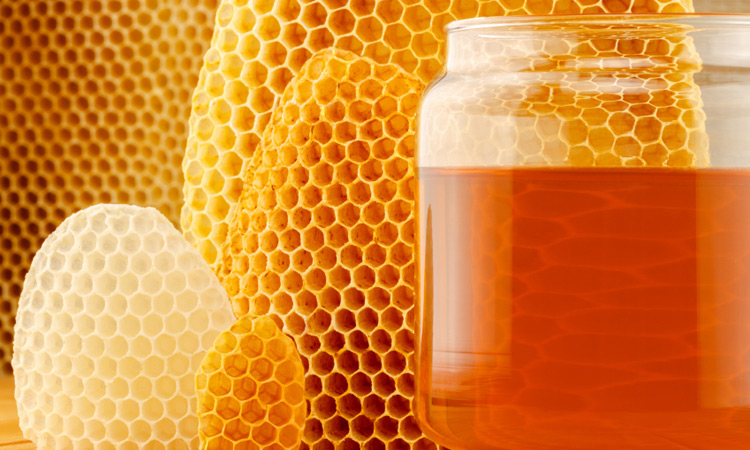Honey, has a variety of remarkable health properties that extend far beyond simply sweetening your tea. This multi-faceted food starts its life as the golden pollen inside flowers before bees mix it with their own saliva and use their vigorous wings to cool it into the golden sap-like product we all know. Here are some:
1. Nutrient rich
In its raw state, honey contains many vitamins and minerals including Vitamin B6, thiamine, niacin, riboflavin and pantothenic acid, as well as calcium, copper, iron, magnesium, manganese, phosphorus, potassium, sodium and zinc. To get the benefit of these naturally occurring nutrients, raw is best, according to Dolores Kent, a certified nutritional specialist in California.
When you pasteurize the honey you lose those nutrients and antioxidants with the heat. It’s the same with baking. It’s better to use honey on foods after they’ve been cooked,” she says. Commercial honeys that have been heavily processed are in many ways no different than refined sugar. She does make sure to remind adults never to give honey to children under the age of one year, because it carries bacteria that could lead to dangerous infant botulism.
2. Sugar alternative
Refined sugars—such as cane sugar, agave, or even stevia—treated with heat and other chemical processes are known to be bad for the blood sugar, as well as the chemical sweeteners like aspartame and sucralose, increase the likelihood of diabetes and weight gain. However, when you eat small doses of raw honey, your body is more likely to metabolize the nutrient-rich source as a food.
In addition, Diana Trinchero, a registered dietitian, says that raw honey is “a popular choice in place of table sugar because it has been processed less and doesn’t carry the concerns of eating foods with GMO sources.” But she warns that it is high in calories, and should be used sparingly.
3. High performance
Honey has many more uses than simply enhancing your palette. The natural sugars in honey—fructose, glucose—are exactly the kind of carbohydrates that muscles need to replenish glycogen stores after, and during, intense exercise. A University of Memphis study found that honey worked as well, if not better, than comparable “sports gels” designed to provide a boost of energy to athletes, without causing hypoglycemic crashes because it is lower on the glycemic index.
4. Fight the flu
Honey has natural antibacterial properties as well as the ability to soothe inflamed tissues, which makes it wonderful as a go-to during run of the mill sore throats and coughs that come with colds and flus. During cold and flu season, says Trinchero, “Mixed in a warm drink, [honey] can help relieve congestion and keep dehydration at bay.” It’s also rich in flavonoids, which may have antiviral, antiallergenic, and antibacterial properties. Kent recommends making a tea with fresh squeezed lemon juice, ginger and honey, and if you can take it, cayenne pepper, and drinking it in a hot bath. “It’s a great way to get mucus moving out of the body in sinuses and chest,” she says.
5. Heal with honey
Besides putting honey in your mouth, the sticky stuff has remarkable healing properties when applied topically to your skin. Many skincare products use it because of its humectant quality—that is, it retains and attracts moisture without increasing oil production in skin. Humans have also been using it medicinally since 2000 BC, according to Sumerian tablets that mention honey’s use as a drug and ointment.
While all honey has a certain amount of antimicrobial activity due to its enzymatic production of hydrogen peroxide, one type, known as Manuka, the honey made from the Tea Tree plant, most commonly found in New Zealand, has such significant antibacterial effects that it’s used to treat wounds, skin infections, and gastric and oral ulcers. Researchers think Manuka’s magic is due to its low pH level, and high sugar content, which inhibit the growth of microbes.
6. Alleviate allergies
For people who suffer terrible hay fever allergies caused by seasonal pollens attacking the sinuses and respiratory system, eating local, unprocessed honey is a very common practice for seeking relief, says Trinchero. Though there is limited research to prove it to be highly effective, and it would depend upon amount of pollen remaining in each batch, Trinchero believes it’s still worth a shot. “Even if it’s only a placebo effect that occurs in lessening allergy symptoms, enjoying some sweet, honey goodness is worth it when feeling down from allergies.” Though the soothing effects of honey may also help with irritated allergy throats.
Whether you eat it, drink it, wear it, or use it to enhance your athletic performance, honey is both a food and a remedy that every household should have on hand.
Click here to find out about Rose’s thoughts on wellbeing and health



